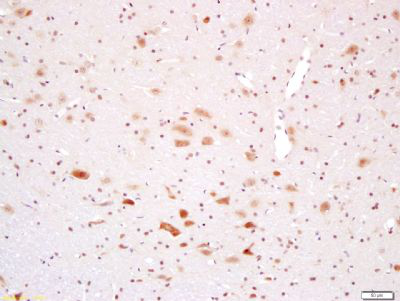产品货号 : mlR4967
英文名称 : PAPOLB
中文名称 : 睾丸特异性核苷酸果糖β抗体
别 名 : PAP beta; PAP-beta; PAPT; poly(A) polymerase beta (testis specific); poly(A) polymerase beta; polynucleotide adenylyltransferase beta; TPAP.
研究领域 : 细胞生物 发育生物学 表观遗传学
抗体来源 : Rabbit
克隆类型 : Polyclonal
交叉反应 : Human, Mouse, Rat, Pig, Cow, Rabbit,
产品应用 : ELISA=1:500-1000 IHC-P=1:400-800 IHC-F=1:400-800 ICC=1:100-500 IF=1:100-500 (石蜡切片需做抗原修复)
not yet tested in other applications.
optimal dilutions/concentrations should be determined by the end user.
分 子 量 : 72kDa
细胞定位 : 细胞核
性 状 : Lyophilized or Liquid
浓 度 : 1mg/ml
免 疫 原 : KLH conjugated synthetic peptide derived from human PAPOLB:351-450/636
亚 型 : IgG
纯化方法 : affinity purified by Protein A
储 存 液 : 0.01M TBS(pH7.4) with 1% BSA, 0.03% Proclin300 and 50% Glycerol.
保存条件 : Store at -20 °C for one year. Avoid repeated freeze/thaw cycles. The lyophilized antibody is stable at room temperature for at least one month and for greater than a year when kept at -20°C. When reconstituted in sterile pH 7.4 0.01M PBS or diluent of antibody the antibody is stable for at least two weeks at 2-4 °C.
PubMed : PubMed
产品介绍 : Polyadenylation of the 3-prime ends of eukaryotic mRNAs is a key event that takes place in the nucleus during maturation of mRNA. The reaction includes endoribonucleolytic cleavage of the pre-RNA at the poly(A) site that leads to synthesis of the poly(A) tail at the 3-prime end of the upstream cleavage product. The poly(A) polymerase (PAP) is required The adenosine addition reaction depends on poly(A) polymerase (PAP) activity. The testis express PAP-Beta (TPAP) in the cytoplasm of spermatogenic cells. The adenosine addition function of PAP-Beta plays a critical role in male germ cell production. PAP-Beta-deficient transgenic mice display impaired expression of haploid-specific genes that are necessary for spermatogenesis. The intronless gene encoding human PAP-∫ maps to chromosome 7p22.3.
Function:
RelevanceThe function of this protein remains unknown. This gene is a member of the myotubularin family and encodes a putative tyrosine phosphatase. Mutations in this gene are a cause of Charcot-Marie-Tooth disease type 4B, an autosomal recessive demyelinating neuropathy. Multiple alternatively spliced transcript variants have been found for this gene, but the protein products of some of these variants are likely not viable, as they are nonsense-mediated mRNA decay (NMD) candidates.
Subcellular Location:
Nuclear
SWISS:
Q9NRJ5
Gene ID:
56903
Important Note:
This product as supplied is intended for research use only, not for use in human, therapeutic or diagnostic applications.
产品图片












